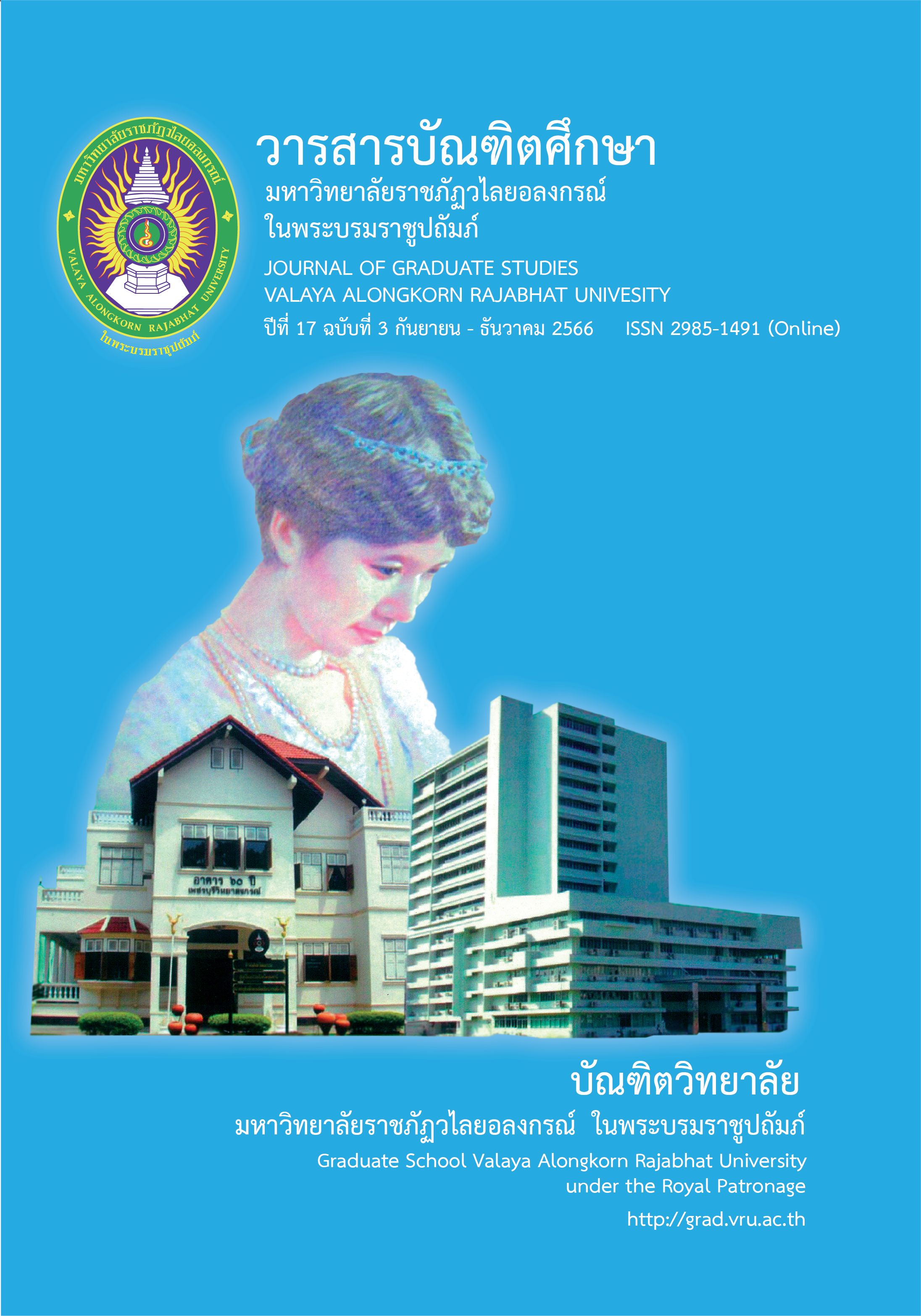THE DEVELOPMENT OF SCIENTIFIC EXPLANATION ABILITY AND SCIENCE ACHIEVEMENT IN “THE SUN” TOPIC USING PHENOMENON-BASED LEARNING FOR GRADE 3 STUDENTS
Main Article Content
Abstract
This research is quasi-experimental in research. The objectives of this study were to 1) compare the learning achievement of pre- and post-study students with phenomenon-based learning management and 2) to study the effect of explanatory abilities. Science of the 3rd-grade students who have been organized to learn by using a phenomenon as a base about the sun and life. The sample group was Grade
3 students at a large primary school. Under the Pathum Thani Primary School District Office 2, in the second semester of the academic year 2021, 20 people were obtained by group randomization. The tools used in the research consisted of (1) learning management plan (2) a form to measure the achievement of students before and after school and (3) the scientific explanatory abilities evaluation: claims, evidence, and reasoning were divided into 3 levels: 1-3. Statistics used in data analysis were percentage, mean score, standard deviation and the t-test statistic of the two samples that were related (t-test dependent).
The results showed that 1) students after receiving the learning management using the phenomenon-based model had higher learning achievements than before receiving the learning management at statistically significant levels of .05, and 2) the students had an average score of 11.19 out of 15, with a 74.6 percentage, which is classified as having a good level of competence.
Article Details

This work is licensed under a Creative Commons Attribution-NonCommercial-NoDerivatives 4.0 International License.
บทความทุกเรื่องได้รับการตรวจความถูกต้องทางวิชาการโดยผู้ทรงคุณวุฒิ ทรรศนะและข้อคิดเห็นในบทความ Journal of Global of Perspectives in Humanities and Social Sciences (J-GPHSS) มิใช่เป็นทรรศนะและความคิดของผู้จัดทำจึงมิใช่ความรับผิดชอบของบัณฑิตวิทยาลัย มหาวิทยาลัยราชภัฏวไลยอลงกรณ์ ในพระบรมราชูปถัมภ์ กองบรรณาธิการไม่สงวนสิทธิ์การคัดลอก แต่ให้อ้างอิงแหล่งที่มา
References
Chaichana, N. (2021). phonkān čhatkān rīanrū dōi chai bō̜ribot pen thān rūam kap theknik kānchai kham thām thī song phon tō̜ khwāmsāmāt nai kān ʻathibāi prākottakān nai chœ̄ng witthayāsāt khō̜ng nakrīan chan prathomsưksā pī thī sī [Effects of context-based learning with questioning techniques on explainphenomena scientifically ability of fourth grade students]. JURNAL of Graduate Research. 12(8), 31 - 44.
Chaiwon, T. & Nugultham, K. (2021). kānčhatkān rīanrū dōi chai prākottakān pen thān: kān rīanrū bǣp būranākān phư̄a songsœ̄m khwāmrū khō̜ng phū rīan nai lōk hǣng khwām čhing [Phenomenon-based learning: integrated learning for enhancing learners’ knowlegde in the real world]. Journal of Graduate Studies Valaya Alongkron Rajabhat University. 15(2), 251 - 263.
Juykrayang, S. (2010). phon khō̜ng kānchai rūpbǣp kān rīan kānsō̜n EIMA thī mī tō̜ manōthat rư̄ang banyākāt læ khwāmsāmāt nai kānsāng khamʻathibāi khō̜ng nakrīan matthayommasưksā tō̜n ton [Effects of using EIMA instruction model on concepts of atmosphere and ability in explanation making of lower secondary school students]. Master's thesis Chulalongkorn University.
Mahavijit, P. (2019). kānprayukchai nǣokhit kānrīanrū dōi chai prākottakān pen thān rūam kap kān rīan bǣp chœ̄ng ruk nai rāiwichā kān prathom sưksā phư̄a sœ̄msāng thaksa kānrīanrū nai satawat thī yīsipʻet [Application of phenomenon-based learning and active learning in elementary education course to enhance 21st century learning skills]. Journal of education khon Kaen University. 42(2), 73 - 90.
McNeill, K. L, Lizotte, D. J. and Krajcik, J. (2006). Supporting students’ construction of scientific explanations by fading scaffolds in instructional materials. The Journal of learning science. 15, 153-191.
Ministry of Education, Office of the Education Council. (2017). phǣnkān sưksā hǣng chāt Phō̜.Sō̜. sō̜ngphanhārō̜ihoksip - sō̜ngphanhārō̜ičhetsipkāo [National Education Plan 2017-2039]. Bangkok: prigwhan.
Nillapun, P. (2008). withī wičhai thāng phrưttikam sāt læ sangkhommasāt [Research methods of behavioral science and Social Science]. 3th ed. Bangkok: Faculty of Education, Silpakorn University.
Office of the National Economic and Social Development Board. (2017). phǣn phatthanā sētthakit læ sangkhom hǣng chāt chabap thī sipsō̜ng [The twelfth national economic and social development plan (2017-2021)]. Bangkok.
PISA Thailand. (2021). phonkān pramœ̄n PISA sō̜ngphansippǣt kān ʻān khanittasāt læ witthayāsāt [PISA Assessment Results 2018 Reading, Mathematics and Science]. 1th. Bangkok: The Institute for the Promotion of Teaching Science and Technology (IPST).
Valanne, E., Al Dhaheri, R. & Kylmalahti, R. (2012). Phenomenon Based Learning Implemented in Abu Dhabi School Model. International Journal of Humanities and Social Sciences. 9(3), 1–17.


